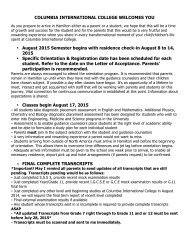french
You also want an ePaper? Increase the reach of your titles
YUMPU automatically turns print PDFs into web optimized ePapers that Google loves.
the past.<br />
In French, the plus-que-parfait is formed by conjugating the auxiliary verb in the imparfait and adding the<br />
past participle. So to conjugate je mange (I eat) in the plus-que-parfait, one finds the appropriate auxiliary<br />
verb (avoir), conjugates it (avais) and finds the past participle of manger (mangé). So, the conjugation of Je<br />
mange in the plus-que-parfait becomes j'avais mangé or, in English, I had eaten.<br />
Examples:<br />
À ce moment, j'ai mangé le pain que tu m'avais<br />
donné.<br />
Tu m'avais déjà appelé, lorsque je suis parti.<br />
At that moment, I ate the bread that you had given<br />
me<br />
When I left, you had already called me<br />
General Examples<br />
J'ai parlé français.<br />
Je parlais français.<br />
Nous avons réussi à l'examen. We passed the test.<br />
Il a été mon ami.<br />
I spoke French (on one particular occasion).<br />
I spoke French (during a period of time, and I don't speak French any more).<br />
He was my friend (and he is not my friend any more)<br />
Il était mon ami lorsque... He was my friend when . . .<br />
Ils ont fait leurs devoirs.<br />
Il est venu.<br />
Il vint le lendemain.<br />
Il venait tous les jours.<br />
Il était déjà venu.<br />
They did their homework.<br />
He came (and I don't need to say when)<br />
He came the day after. (this is the passé simple)<br />
He came/used to come every day.<br />
He had already come.<br />
It should be noted that these examples are making use of all the possible past tenses; not just the<br />
plus-que-parfait.<br />
V: Mass Media<br />
V: Part-Time Jobs




